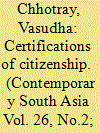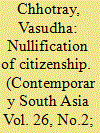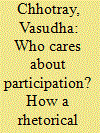|
|
|
Sort Order |
|
|
|
Items / Page
|
|
|
|
|
|
|
| Srl | Item |
| 1 |
ID:
159866


|
|
|
|
|
| Summary/Abstract |
Experiences in the post-partition Indian subcontinent refute the conventional expectation that the ‘possession of citizenship enables the acquisition of documents certifying it’ [Jayal 2013. Citizenship and Its Discontents: An Indian History. Cambridge, MA: Harvard University Press, 71]. Instead, identity papers of various types play a vital part in certifying and authenticating claims to citizenship. This is particularly important in a context where the history of state formation, continuous migration flows and the rise of right-wing majoritarian politics has created an uncertain situation for individuals deemed to be on the ‘margins’ of the state. The papers that constitute this special issue bring together a range of disciplinary perspectives in order to investigate the history, politics and materiality of identity documents, and to dismantle citizenship as an absolute and fixed notion, seeking instead to theorise the very mutable ‘hierarchies’ and ‘degrees’ of citizenship. Collectively they offer a valuable lens onto how migrants, refugees and socio-economically marginal individuals negotiate their relationship with the state, both within South Asia and in South Asian diaspora communities. This introduction examines the wider context of the complex intersections between state-issued identity documents and the nature of citizenship and draws out cross-cutting themes across the papers in this collection.
|
|
|
|
|
|
|
|
|
|
|
|
|
|
|
|
| 2 |
ID:
159870


|
|
|
|
|
| Summary/Abstract |
This paper discusses the case of a community of Bengali immigrant settlers along the coast of Odisha in India at the centre of a unique citizenship controversy. Families have arrived here gradually over the years since 1947, and have generally acquired a range of identity documents from Indian state agencies. These documents certify to a range of rights that signal social and political participation within India: land ownership, voting rights and the receipt of official welfare subsidies. With little warning, a 2005 order by the state government following a high court directive led to the production of a list of 1551 persons, declaring such persons as ‘infiltrators’. The list ostensibly comprises those who have entered India illegally after 1971 or born to parents who entered illegally. While no deportation, as originally intended, has taken place, the nullification of their various documents of citizenship has created a void in their lives. This paper examines the wider politics of the case, especially focusing on how those with nullified documents negotiate the authority of the local state and actors within their own society, and what this reveals about the ever contested nature of citizenship in post-partition India.
|
|
|
|
|
|
|
|
|
|
|
|
|
|
|
|
| 3 |
ID:
073688


|
|
|
|
|
| Publication |
2005.
|
| Summary/Abstract |
This article responds to a recently made proposition that development policy does not drive practice but, instead, that practice produces policy, with key actors striving to maintain coherent representations of it. This proposition is used to examine the translation of the national policy for participatory Watershed Development in India into concrete procedures at the district level and, ultimately, the practices that follow to sustain them. While uncovering a definite chain of 'upward' representations in the relationship between practice and policy, this article discovers a striking disjuncture in the stakes of those who formulate the policy and all those who implement it, even in upholding a formal commitment to participation as the new authorised policy. This article demonstrates how participation actually works as a rhetorical state strategy in the face of widespread incredulity, with seriously impairing effects for equity as a policy objective.
|
|
|
|
|
|
|
|
|
|
|
|
|
|
|
|
|
|
|
|
|